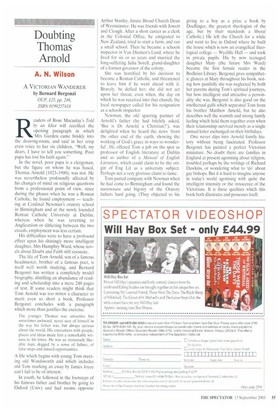Doubting Thomas Arnold
A. N. Wilson A VICTORIAN WANDERER by Bernard Bergonzi OUP, £25, pp. 248, ISBN 0199257418 Readers of Rose Macau lay's Told by an Idiot will recollect the opening paragraph in which 'Mrs Garden came briskly into the drawing-room, and said in her crisp even voice to her six children, "Well, my dears, I have to tell you something. Poor papa has lost his faith again."'
In the novel, poor papa is a clergyman, but the figure on whom he was based, Thomas Arnold (1823-1900), was not. He was nevertheless profoundly affected by his changes of mind on religious questions from a professional point of view, since during the phases when he was a Roman Catholic, he found employment — teaching at Cardinal Newman's oratory school in Birmingham and at the newly founded Roman Catholic University at Dublin; whereas when he was reverting to Anglicanism or dithering between the two creeds, employment was less certain.
His difficulties were to have a profound effect upon his shiningly more intelligent daughter, Mrs Humphry Ward, whose novels about Doubt and Faith still resonate.
The life of Tom Arnold, son of a famous headmaster, brother of a famous poet, is itself well worth studying, and Bernard Bergonzi has written a completely model biography, distilling an abundance of reading and scholarship into a mere 248 pages of text, If some readers might think that Tom Arnold was too minor a character to merit even so short a book, Professor Bergonzi concludes with a paragraph which more than justifies the exercise:
The younger Thomas was attractive but sometimes awkward, never sure of himself in the way his father was, but always curious about the world. His encounters with people, places and ideas made him a remarkable witness to his times. He was an immensely likeable man, dogged by a sense of failure, of false steps and missed opportunities.
A life which begins with young Tom meeting old Wordsworth and which includes old Tom marking an essay by James Joyce can't fail to be of interest.
In youth, he followed in the footsteps of his famous father and brother by going to Oxford (Univ) and had rooms opposite Arthur Stanley, future Broad Church Dean of Westminster. He was friends with Jowett and Clough. After a short career as a clerk in the Colonial Office, he emigrated to New Zealand, tried to start a farm, and ran a small school. Then he became a schools inspector in Van Diemen's Land. where he lived for six or so years and married the long-suffering Julia Sore11, grand-daughter of a former governor of the colony.
She was horrified by his decision to become a Roman Catholic, and threatened to leave him if he went ahead with it. Bravely, he defied her; she did not act upon her threat, even when, the day on which he was received into that church, the local newspaper called for his resignation as a schools inspector.
Newman, the old sparring partner of Arnold's father (he had bitchily asked, 'But is Dr Arnold a Christian?), was delighted when he heard the news 'from the other end of the earth, showing the working of God's grace in ways so wonderful'. He offered Tom a job on the spot as professor of English literature at Dublin and as author of a Manua/ of English Literature, which could claim to be the origin of Eng Lit as a university subject. Perhaps not a very glorious claim to fame.
Tom parted company with Newman when he had come to Birmingham and found the narrowness and bigotry of the Oratory fathers hard going. (They objected to his giving to a boy as a prize a book by Doellinger, the greatest theologian of the age, but by their standards a liberal Catholic.) He left the Church for a while and went to live in Oxford where he built the house which is now an evangelical theological college — Wycliffe Hall — and took in private pupils. His by now teenaged daughter Mary (the future Mrs Ward) became the first female reader in the Bodleian Library. Bergonzi gives sympathetic glances at Mary throughout his book, noting how painfully she was neglected by both her parents during Tom's spiritual journeys, but how intelligent and attractive a personality she was. Bergonzi is also good on the intellectual gulfs which separated Tom from his brother Matthew Arnold, but he also describes well the warmth and strong family feeling which held them together even when their relationship survived merely as a single annual letter exchanged on their birthdays.
One never dips into Arnold family history without being fascinated. Professor Bergonzi has painted a perfect Victorian miniature. No doubt there are families in England at present agonising about religion, troubled perhaps by the writings of Richard Dawkins, or wondering what to 'do' about gay bishops. But it is hard to imagine anyone in today's world agonising with quite the intelligent intensity or the innocence of the Victorians. It is these qualities which this book both illustrates and possesses itself.


























































































 Previous page
Previous page